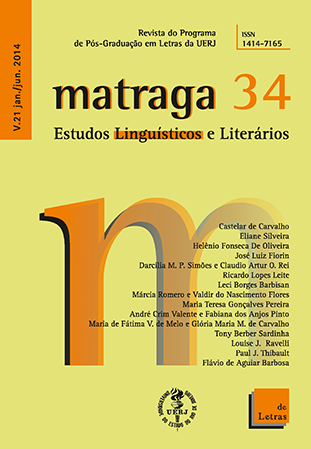FREEDOM OF COMBINATION AND HETEROGENEITY: A CORPUS LINGUIST’S LOOK AT TWO SAUSSUREAN INSIGHTS
Palavras-chave:
Saussure, linguística de corpus, colocação, liberdade de combinação, heterogeneidade.Resumo
This article offers a reexamination of two of Saussure’s insights from the point of view of corpus linguistics—namely, freedom of combination and heterogeneity in language in use. Regarding the first insight, an analysis of word combinations in a corpus of newspaper texts written in Brazilian Portuguese was carried out to determine how many of these combinations were actual collocations—that is, were used frequently enough in a very large reference corpus (the Brazilian corpus) to warrant statistical significance. The results suggested that most word combinations are not free; rather, they follow previously established preferences among speakers. Regarding the second notion, that of heterogeneity, the collocations in the newspaper texts were tracked as they were deployed one after the other along each text, and this flow was visually depicted. The inspection of the charts revealed unique patterns of the distribution of collocation, thereby suggesting that the evidence supports the view of heterogeneity. A cluster analysis was later conducted on the amount of collocations in each text, revealing three basic collocation bands onto which all the texts can be fitted. This was interpreted as suggesting that heterogeneity, despite being present and noticeable, is constrained rather than limitless. The article concludes that the methods and techniques afforded by present-day corpus linguistics can shed light onto Saussure’s many valuable insights.
------------------------------------------------------------------------------
LIBERDADE DE COMBINAÇÃO E HETEROGENEIDADE: UM OLHAR DA LINGUÍSTICA DE CORPUS EM DOIS INSIGHTS SAUSSUREANOS
O artigo reexamina dois dos insights de Saussure a partir da perspectiva da linguística de corpus, a saber a liberdade de combinação e a heterogeneidade no uso da língua. Com relação ao primeiro, foi feita uma análise de combinações de palavras em corpus de textos de jornais para determinar quantas eram realmente colocações, isto é, quantas eram usadas com frequência suficiente num corpus de referência (o Corpus Brasileiro). Os resultados sugerem que a maioria das combinações de palavras não são livres, mas seguem preferências previamente estabelecidas pelos sujeitos falantes. Com relação à segunda noção - heterogeneidade - as colocações dos textos de jornal foram acompanhadas conforme eram empregadas uma após a outra ao longo dos textos, sendo esse fluxo capturado de forma visual. A inspeção dos diagramas revelou padrões únicos de distribuição de colocações, evidenciando dessa forma a visão da heterogeneidade. Uma análise de agrupamento foi feita sobre as colocações em cada texto, revelando três níveis de colocabilidade. Esses níveis indicaram que a heterogeneidade, apesar de presente e aparente, sofre coerções e tem limites. O artigo conclui que os métodos e técnicas da linguística de corpus atual podem iluminar muitos dos insights valiosos propostos por Saussure.
---
Original em inglês.
Downloads
Downloads
Publicado
Como Citar
Edição
Seção
Licença
AUTORIZAÇÃO
A Matraga – Revista do Programa de Pós-Graduação em Letras da UERJ está autorizada a publicar o artigo ora submetido, caso seja aceito para publicação online. Fica atestado que a contribuição é original, que não está sendo submetida a outro editor para publicação, e que a presente declaração é a expressão da verdade.
Os trabalhos publicados no espaço virtual da Matraga – Revista do Programa de Pós-Graduação em Letras da UERJ serão automaticamente cedidos, ficando os seus direitos autorais reservados à Matraga. Sua reprodução, total ou parcial, é condicionada à citação dos autores e dos dados da publicação.

A Matraga utiliza uma Licença Creative Commons - Atribuição-NãoComercial 4.0 Internacional.





